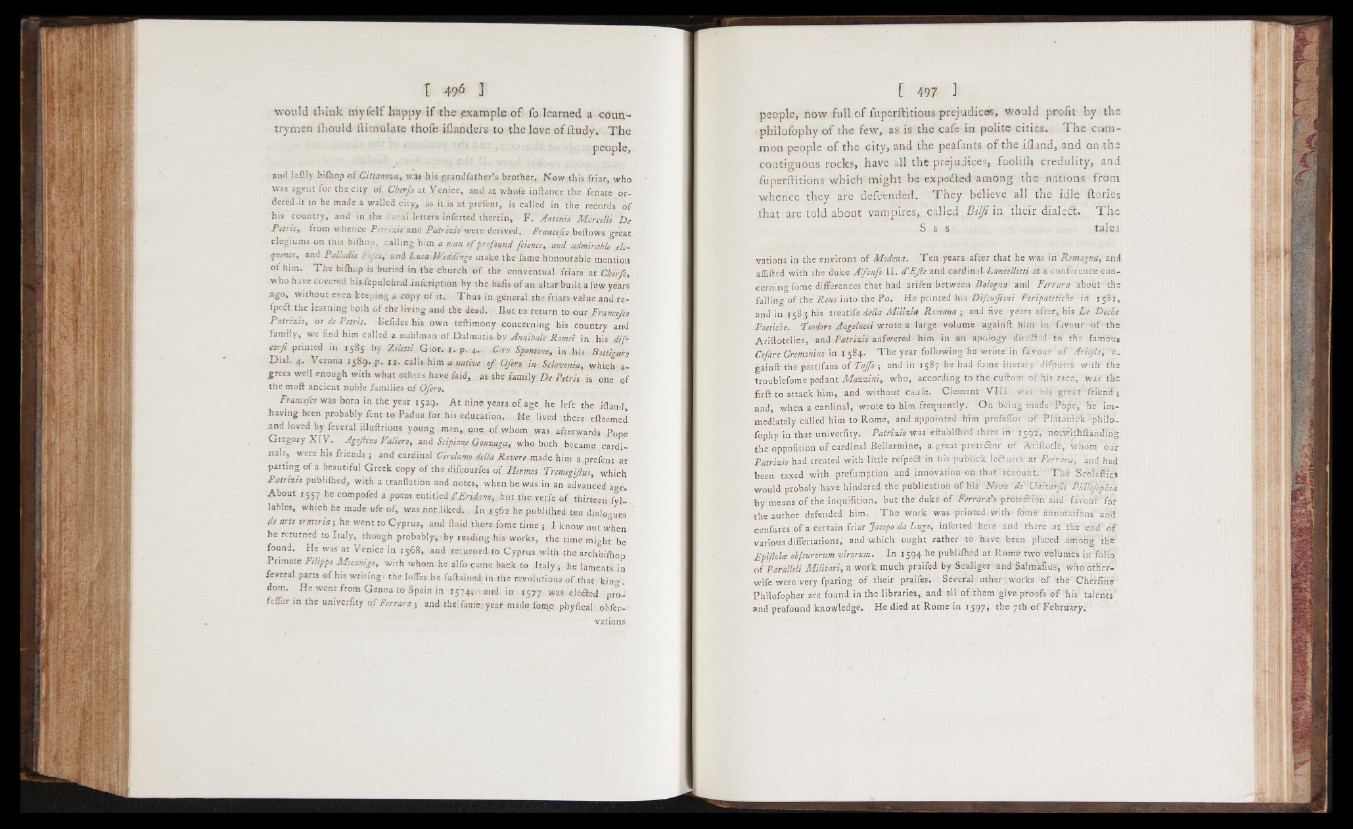
would think my ielf happy i f the .example o f fo learned a countrymen
fhauld ilimulate thofp iflanders to the love o f Itudy. The
people,
and laffly bifiiop of Cittamva, was bis grandfather’s brother. Now this friar, who
was agent for the city of Cberfo at Venice, and at whofe inftance the fenate ordered
-it to be made a walled city, as it.is at prefent, is called in the records of
his country, and in .the ducal letters inferted therein, F. Antonio Marcello De
Pétris, from whence /Vrraw'i.and Patrizio were derived. Francefco bellows great
elogiums on this bifiiop, calling him a man o f profound feience, and admirabU eloquence,
and Palladio Fcjco, and Luca Weddingo make the .fame honourable mention
of him. The bifiiop is buried in the church of the conventual friars at Cberfo,
who have covered his-fepulchral .infcription by the bafts of an altar built a few years
.ago, without even keeping .a copy of it. Thus in general the friars value and re-
fpedt. the learning both of the living and the dead. But to return to our Francefco
Patrizio, or de Petns. Befides his own teftimony concerning his country and
family, we find him called a noblman of Dalmatia by Annibale Romei in his dif-
corfi printed in 1585 by Ziletti Gior. 1. p. 4. C.ro Sfiontone, in his Bottigaro
Dial. 4. Verona 1589. .p. II. calls him a native o f Ofero in Sclàvonia, which a-
grees well enough with what others have faid, as the family De Pétris is one of
the moft ancient noble families 0/ Ofero.
Francefco was born in the year 1529. At nine years of age, he left the ifland
having been probably fent to Padua for his education. He lived there efteemed
and loved by feveral illuftrious young men, one of. whom was afterwards Pope
Gregory XIV. Agojiino Pali era, and Scipionp. Gonzagç, who both became cardinals,
were his friends j and cardinal Girolamo della Rovere made him a prefent at
parting of a beautiful Greek copy of the difcourfes of Hermes Tremegi/lus, which
Patrizio pubilihed, with a tranflation and notes, when he was in an advanced age.
About 1557 he compofed a poem entitled fEridano, but.the yerfe of thirteen fyl_
lables, which he made ufe of, was not,liked. In 1562 he publilhed ten dialogues
de arte eratoria ; he went to Cyprus, and ftaid there fome time j I know not when
he returned to Italy, though probably, by reading his works, the time might be
found. He was at Venice in 1568, and returned to Cyprus with the archbiihop
Primate Filippo Mocanigo, with whom he alfo came back to Italy j he laments in
feveral parts of his writing: the Ioffes he fuftalned in the revolutions of that kin»
dom. He went from Genoa to Spain in 1574, and in 1577 was eieâed pro-
feffor in the umverfity of Ferrara ; and the.fame; year made fome phyfical- obfervations
people, now full o f fuperftitious prejudicos, would profit by the
philofophy o f the few, as is the cafe in polite cities. The common
people of the city, and the peafants o f the ifland, and on the
contiguous rocks, have all the prejudices, fooliih credulity, and
fuperditions which might be expedled among the nations from
whence they are defcended. They believe all the idle ftories
that are told about vampires, called Biljt in their dialed. T h e
.S s s tales
vations in the environs of Modena. Ten years after that he was in Romagna, and
affifted with the duke Alfonfo II. d’EJle and cardinal. £ anceUotti at a conference concerning
fome differences that had arifen between Bologna and Ferrara about the
falling of the Reno into the Po. He printed his Difcuffioni Peripatetiche in 1581,
and in 1583 his treatife della Milizia Romana ; and five years after, his L e Deche
Poetichc. feodoro Angelucci wrote a large volume againft him in favour -of the
Ariftotelics, ami Patrizio anfvvcred him in an apology directed to the famous
Cefare Cremonino in 1584. The year following he wrote in favour of Ariojlo, ' a.
gainft the partifans of Tajfo -, and in 1587 he had fome literary difputes with the
troublefome pedant Mazz ini, who, according to the cuftom of his race, was the
firft to attack him, and without caufe. Clement VIII. was his great friend ;
and, when a cardinal, wrote to him frequently. On being made Pope, he immediately
called him to Rome, and appointed him profèffor of Platonick- philofophy
in that univerfity. Patrizio was eftablfhed there in 1592, notwithftanding
the oppofition of cardinal Bellarmlne, a great proteflor of Ariftotle, whom our
Patrizio had treated with little refpeit in his publick leisures at Ferrara, and had
been taxed with prefumption and innovation on that account.' The ScôÎaîïiçi
would probaly have hindered the publication of his Nova de Univèrfis Phiïofopbia
b y means of the inquifition, but the duke of Ferrara's -protection and favour for
the author defended him. The work was printed.-with» ionie annotations and
cenfures of a certain friar Jacopo da Lugo, inferted here arid there at the end of
various differtations, and which ought rather to have been placed among the
Epijloles objeurorum virorum. In 1594 he publiflied at Rome two volumes in folio
of Paralltli Militari, a work much praifed by Sealiger and Salmafius, who other-
wife were very fparing of their praifes. Several other works of the Chcrfine
Philofopher are found in the libraries, and all of them give proofs of his talents
and profound knowledge. He died at Rome in 1597, the 7th of February.